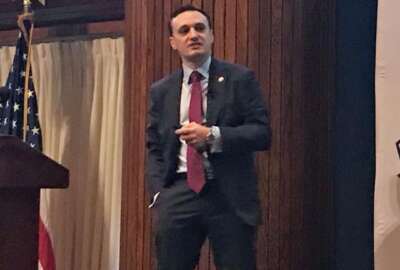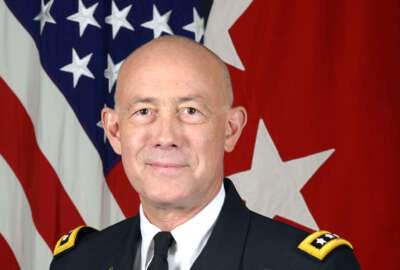
Former Space Force CSO explains how to make software development process more effective
Nicolas Chaillan, former Air Force and Space Force chief software officer, joins Aileen Black on Leaders and Legends to talk about his experience in leading the...
Nicolas Chaillan, former Air Force and Space Force chief software officer, joined Aileen Black on Leaders and Legends to talk about his experience leading the Defense Department through the software development process. He also shared his frustrations in trying to streamline this process and make it more effective.
Chaillan was appointed as the first Air Force chief software officer (CSO), and was responsible for guiding Air Force programs through the transition to agile software development and DevSecOps. He established force-wide DevSecOps capabilities and best practices, including continuous authority to operate (c-ATO) processes and faster streamlined technology adoption.
In addition to his public service, Chaillan is a technology entrepreneur, software developer, cyber expert and inventor. He has over 19 years of domestic and international experience with strong technical and subject matter expertise in cybersecurity, software development, product innovation, governance, risk management and compliance. Specifically, these fields include cloud computing, cybersecurity, DevSecOps, big data, multi-touch, mobile, IoT, mixed and virtual reality, and wearables.
Chaillan decided to come work for the federal government after the Paris terrorist attacks and started at the Department of Homeland Security. He then went to DoD to bring innovation to the war fighter and ensure that younger citizens have a fighting chance against China in the future.
“It is disgraceful, and it is not too late but we have to have a sense of urgency if our kids and grandkids are going to be able to compete with China,” he said.
According to Chaillan, the United States need to rapidly invest in software innovation and agile software development to stay ahead of China.
“Software can make the difference between getting ahead or staying ahead. Our government leaders urgently need to embrace innovation and we need leaders that understand technology,” he said. “We are running out of time. China is not waiting for us to figure it out.”
Chaillan also believes that the U.S. should invest more money in education to train the next generation of leaders. He said national security will be an issue in the future without that investment.
“We need to invest in curriculum for our schools that are not 10 to 15 years behind as they are today. We need top talent to go back and teach these future leaders. AI , cybersecurity and data science need to be invested in to help develop our future talent. We don’t have the luxury of time, we need a sense of urgency to do this now,” he said.
Chaillan added that the federal government needs to do a better job of keeping top talent from leaving public service and going to the private sector. In fact, he described the entire system as broken, saying government agencies need step up efforts to partner with other organizations and with businesses in the private sector.
“We see all the bright ones leaving. The entire model is broken, the pay is too low, and there is no progression of titles without going into management,” he said. “This is not a model that will let us succeed.”
He expressed frustration at what he called the “DoD bubble” which lacks competition and uses only large traditional contractors.
“Projects need to be cut up and have more diversity on who does the work. We need to partner to get to joint outcomes. Many times the tech stacks are the same,” he lamented. “If you add to the lack of innovation and no software agile training, all these compounds — it is an incredible waste of tax dollars.”
Chaillan believes that “DoD bubble” also hurts the department because it prevents federal managers from easily bringing in outsiders, resulting in an agency run by employees who spend their entire life within and only know what’s happening in the DoD space.
He also said Congress needs to take on a greater role in getting DoD and other agencies to embrace innovation in the software development process.
“Congress has to wake up, raise the awareness, raise the sense of urgency. It is not too late to fix it. When you come from a startup and then go to a massive organization like DoD, it is frustrating to see the DoD staff wanting to do the right things but the system is broken,” he said.
He resigned from his post as chief software officer in part because he shared many of those same frustrations. He hoped his departure would raise awareness of what he said was “Too much talk and not enough action, particularly around funding, staffing and prioritizing basic IT issues across DoD.”
He added, “DoD remains stuck in the outdated water-agile-fall acquisition processes that are inhibiting programs to move at the pace of relevance.”
His perspective on leadership and culture in the workplace is that good leaders empower their employees by letting them participate in the decision making process. As for the next generation, he had some advice:
“Believe in what you want to do and go do it. Believe in yourself, don’t listen to others, just do it. Work hard and make things happen. Don’t think about money — money will come if you do the right things. Believe in yourself.”
Copyright © 2024 Federal News Network. All rights reserved. This website is not intended for users located within the European Economic Area.
Related Stories





